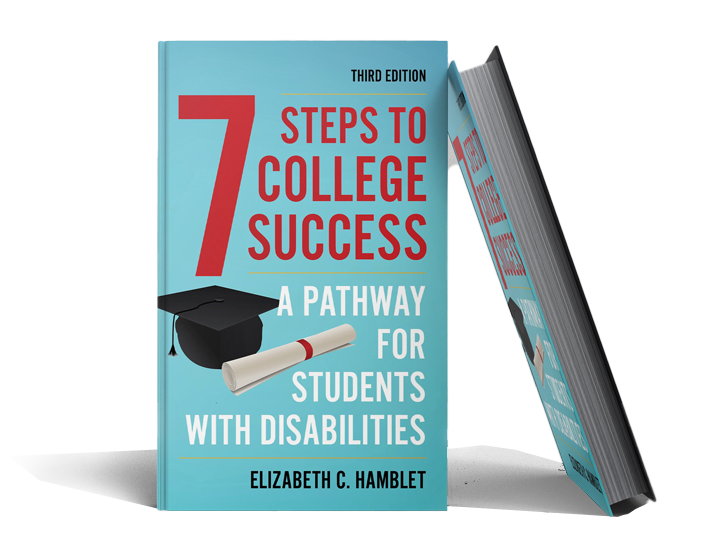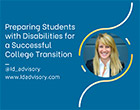Introduction
One of the things students with disabilities and their families wonder is what accommodations are commonly approved at college, and which aren’t, and how students get access to them. They may hear things from others, such as that private colleges offer more and better accommodations than public ones, or that highly selective colleges offer fewer accommodations than community colleges. The truth is that the choice of accommodations from school to school cannot be predicted in this way.
In developing my book, I interviewed disability services directors at a variety of kinds of institutions, including state, art, community, and highly-selective colleges. What appears here are responses that are individual responses that (in my experience in over 25 years in the field) represent the overall picture at the college level across different kinds of institutions, but students should always research DS offices at the schools on the college list. [Read this post or watch this video to learn how to do this research.]
[The focus of this post is on academic accommodations, but students should be aware that colleges offer accommodations across all parts of their programs, including housing, dining, etc.]
When can students register with your office? How long does the process take from the time students initiate the process to when you let them know what’s approved?
Doris Pierce is Director of Office of Accessibility Resources and Services at University of Central Arkansas
We’d like for them to register as soon as they plan to attend – even as early as six months before they’ll start. We don’t know what needs they have and we like to be able to talk to department chairs if they have a request we haven’t seen before and aren’t sure how to accommodate in certain programs. We really like to have accommodations in place when students are ready to start.
Once students provide documentation, it takes anywhere from 2-3 days to a week to approve their accommodations. Sometimes, it can happen the same day if they have the documentation they need when they come for their intake meeting. If they can talk about the difficulties they have, what their needs look like when their condition is exacerbated, etc., it can help us to make the decision quickly.
What are the accommodations most students request that are approved?
Stacey Reycraft is Director of Student Disability Services at the University of Mississippi
For tests, we commonly approve extended time, testing in a room where distractions are reduced, and use of assistive technology. We also typically approve students to use technology for note taking, such as an audio recorder or their laptop. For those with print-related disabilities, we would provide assistive technology, too. For students with chronic health or psychological conditions, we might provide some attendance flexibility.
What are some accommodations that aren’t typically approved?
Jamie Axelrod is the Director of Disability Resources at Northern Arizona University
Not everyone who requests copies of someone else’s notes gets approved for this. We may instead approve them to record lectures so they can fill in gaps in their own notes. We may ask faculty members to provide the slides (if they are willing).
Some students request accommodations that they had in high school that aren’t appropriate at the college level. We don’t approve any requests that lower established standards. These include modifications to the amount of work students are expected to do, or the standards by which their work will be graded.
Sometimes students request accommodations that your office turns down. When this happens, do you tell students why it was turned down and you know how could they appeal it? Have you ever changed your mind?
Spencer Scruggs is Director of the Center for Accessible Education at UCLA
I will tell them when I think something isn’t appropriate and I can’t approve it, and I also tell them why.
But I’ll also try to probe a little to see if there’s a different answer besides the accommodation they want that isn’t appropriate.
For instance, if they’re missing assignments and asking for extensions, I’ll explain that those are to be used in a very specific way. They would require students to notify the instructor in advance that they will be unable to meet the deadline. In many cases, the students asking for extensions wouldn’t be able to do that, because they’re waiting until the last minute to even start their papers. So the deadline extension really won’t work for them.
So I explain that, and then I’ll let them know where on campus they can find help with time management or other support sources that will set them up for success.
If students are unhappy with my decision, they can make an informal grievance to a member of my staff. Or they can file a formal grievance, where a panel of impartial faculty members and other staff members review the request and make a decision. We try to guide students toward the informal grievance procedure first, but a student has a plethora of options to choose from to appeal any decision made by our office.
Are there any accommodations you think are underutilized?
Ann Knettler was Director of the Center for Disability Resources at Delaware State University at the time of her interview
In my experience, it’s note taking accommodations. For instance, if we grant them permission to record, we teach them how to make it a useful accommodation, but they don’t do it. Or if we approve them to get PowerPoint slides ahead of time, they don’t look at them before class. Or if they get copies of a classmates’ notes, they never look at them.



